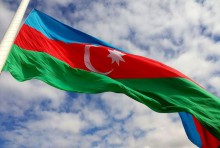The collapse of the USSR in mid-to-late 1991 had a dramatic effect on the South Caucasus. There was in fact a war between Azerbaijan and Armenia, which caused domestic difficulties. Besides, Moscow took a twofaced attitude, trying to hamper, one way or another, the formation of new post-Soviet states.
An extremely difficult domestic political situation emerged in Azerbaijan in the summer of 1993, which threatened to ruin the state that had just restored its independence.
The period when the Azerbaijani National Front with President Abulfaz Elchibey at the head saw a series of military defeats in Nagorno-Karabakh and the nearby areas as well as an ever-worsening economic and financial situation. Taking advantage of this, certain forces inside the country resorted to an open military confrontation with Baku.
In late May 1993 Colonel Surat Huseynov organized a mutiny. His units approached the capital in early June. In the situation of a most serious political crisis, Heydar Aliyev, Chairman of the Supreme Majlis of Nakhchivan, arrived in Baku in an attempt to resolve it. But Huseynov and President Elchibey failed to come to terms.
Then Heydar Aliyev was elected head of the Azerbaijani parliament on June 15, 1993. Aliyev himself reminisced later about the seriousness of the situation: “There was a civil war here. People were shooting at one another. Everybody had an armed unit of his own. It took me two and a half years to restore order.” The Milli Majlis resolved on July 24 that Aliyev perform the functions of president of the Azerbaijani Republic.
But there were other tests in store for Azerbaijan’s statehood.
Alikram Hummatov, a colonel of the Azerbaijani army, aggravated the crisis. Speaking on Lankaran television on June 21, he announced the establishment of the Talysh-Mughan Autonomous Republic. Obviously, the revolt was aimed against the appointment of Aliyev as president.
But it became clear very soon that the revolt was fizzling out. No strain on relations between the Azerbaijanis and the Talysh people, an Iranian ethnic group in Azerbaijan, was noticed. Moreover, in spite of Hummatov’s high-sounding statements, the mutinous formation received no support. In late August, people gathered in front of the Lankaran City Hall in protest against Hummatov’s activities. He had to hide himself. The insurrection failed altogether.
Heydar Aliyev played the crucial role in the consolidation of the Azerbaijani state. It is for this reason that he won 98.8 percent of the votes in the presidential elections on October 3, 1993.
In spite of the so obvious public support, the domestic political situation remained difficult. Surat Huseynov, now the prime minister, tried again to seize power, but failed to do so. Nobody supported him. There were also other attempts of armed rebellion, but they were all doomed to failure.
The ongoing military conflict over Nagorno-Karabakh also contributed to political instability. The ceasefire agreement signed in May 1994 in Bishkek is still formally in force. Yet tension on the disengagement line remains high.
The cessation of military operations allowed Aliyev to focus on tackling the urgent economic problems. As soon as September 20, 1994, a “contract of the century” was signed with the world’s largest oil and gas corporations to develop the Azeri-Chirag-Gunashli oil field in the Azerbaijani sector of the Caspian Sea. This attracted foreign investments, and encouraged industrial and agrarian development. Funny as it looks today, Azerbaijan bought gas from Russia before the mid-1990s.
On Aliyev’s initiative, the Constitution of Azerbaijan abolished state monopoly on land and recognized the right of private land ownership.
All this allowed stabilizing the domestic political situation in the country by the end of the 1990s and ensuring a relatively long economic growth.
By the resolution of parliament, June 15, 1993, is marked as National Salvation Day. It received the status of an official holiday in 1998.
Like Ukraine, Azerbaijan became an object of foreign aggression. A part of its territory is occupied, and the prospects of a peaceful settlement of the Nagorno-Karabakh conflict, as well as liberation of the seized areas, remain uncertain.
Ukraine has always supported Azerbaijan’s territorial integrity. Baku has always sided with our country in international forums. All this lays a good groundwork for the development of fruitful bilateral relations.








